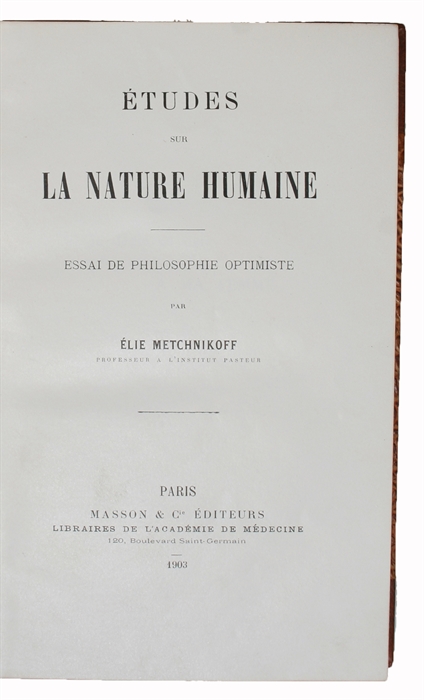FOUNDING GERONTOLOGY
METCHNIKOFF, ÉLIE.
Études su la Nature Humaine. Essai de philosophie optimiste.
Paris, Masson et Cie, 1903. 8vo. Nice contemporary half calf with four raised bands and gilt lettering to spine. Light miscolouring to spine. A nice and clean copy. (8), 399 pp.
First edition of the groundbreaking work, in which Metchikoff coins "gerontology" and establishes the field, which today is considered more important than ever, namely the study of the social, psychological and biological aspects of aging.
Earlier on, Metchnikoff had made pioneering studies in immunology, and these led him on to the problems of biological ageing. His first work on the subject is the present, in which he coins the term "gerontology" and advances the idea that senile changes result from the toxins produced by bacteria in the intestine. In order to prevent these "unhealthy fermentations", Metchnikoff advocates the inclusion of sour milk on one's diet. As his ideas of "right living" were so closely connected with the consummation of large amounts of fermented milk or yoghurt made with a Bulgarian bacillus, his name actually came to be associated with a popular commercial preparation of yogurt (although he received no royalties).
His studies into the potential life-lengthening properties of lactic acid bacteria, inspired Japanese scientist Minoru Shirota to begin investigating the causal relationship between bacteria and good intestinal health, which eventually led to the worldwide marketing of Kefir and other fermented milk drinks or probiotics, still extremely popular today.
Apart from the consummation of yoghurt, Metchnikoff warned of eating uncooked foods, claiming that the bacteria present on them could cause cancer. Metchnikoff claimed he even plunged bananas into boiling water after unpeeling them and passed his silverware through flames before using it.
"In his "Nature of Man" Metchnikoff argued that when diseases have been suppressed and life has been hygienically regulated, death would come only with extreme old age. Death would then be natural, accepted gratefully, and robbed of its terrors." (D.S.B. IX: 334-35).
He continued writing on ageing and death until 1910. In 1908 he shared the Nobel Prize for medicine with Ehrlich for his work on immunity.
Order-nr.: 48587


